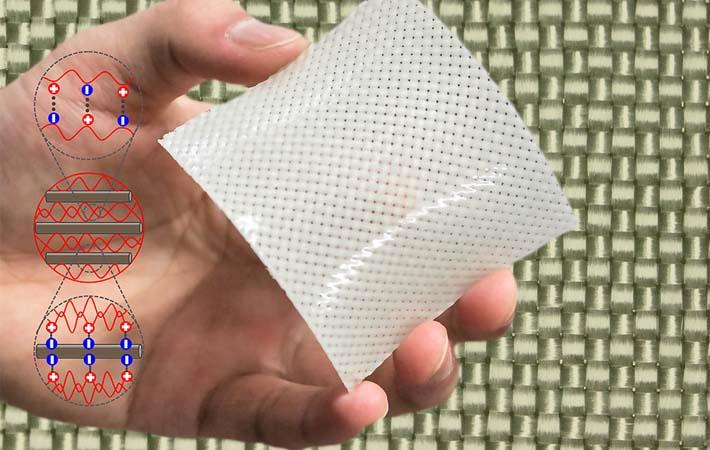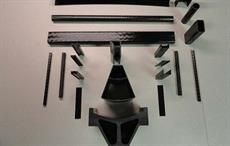Scientists in Japan have created 'fibre-reinforced soft composites' - tough hydrogels combined with woven fibre fabric which are highly flexible and tough. These fabrics have a range of potential applications as in fashion and manufacturing. Because of their reliability and durability, these may come up as artificial ligaments and tendons.
Scientists in Japan have created 'fibre-reinforced soft composites' - tough hydrogels combined with woven fibre fabric which are highly flexible and tough. These fabrics have a range of potential applications as in fashion and manufacturing. Because of their reliability and durability, these may come up as artificial ligaments and tendons.#
The research has been carried out by scientists at the Hokkaido University. The fabric created is even tougher than metals.
Scientists in Japan have created 'fibre-reinforced soft composites' - tough hydrogels combined with woven fibre fabric which are highly flexible and tough. These fabrics have a range of potential applications as in fashion and manufacturing. Because of their reliability and durability, these may come up as artificial ligaments and tendons.#
Efforts are currently underway around the world to create materials that are friendly to both society and the environment. Among them are those that comprise different materials, which exhibit merits of each component. The newly developed fibre-reinforced hydrogel consists of polyampholyte gels and glass fibre fabric. The team theorises that toughness is increased by dynamic ionic bonds between the fibre and hydrogels, and within the hydrogels.
Scientists in Japan have created 'fibre-reinforced soft composites' - tough hydrogels combined with woven fibre fabric which are highly flexible and tough. These fabrics have a range of potential applications as in fashion and manufacturing. Because of their reliability and durability, these may come up as artificial ligaments and tendons.#
The researchers focused on creating a reinforced material using hydrogels. Though such a substance has potential as a structural biomaterial, up until now no material reliable and strong enough for long-term use has been produced. The study is part of the Cabinet Office's Impulsing Paradigm Change through Disruptive Technologies Programme (ImPACT).
Scientists in Japan have created 'fibre-reinforced soft composites' - tough hydrogels combined with woven fibre fabric which are highly flexible and tough. These fabrics have a range of potential applications as in fashion and manufacturing. Because of their reliability and durability, these may come up as artificial ligaments and tendons.#
The team combined hydrogels containing high levels of water with glass fibre fabric to create bendable, yet tough materials, employing the method used to produce reinforced plastics. The team found that a combination of polyampholyte gels, a type of hydrogel they developed earlier, and glass fibre fabric produced a strong, tensile material. The procedure to make the material is simply to immerse the fabric in polyampholyte precursor solutions for polymerisation.
Scientists in Japan have created 'fibre-reinforced soft composites' - tough hydrogels combined with woven fibre fabric which are highly flexible and tough. These fabrics have a range of potential applications as in fashion and manufacturing. Because of their reliability and durability, these may come up as artificial ligaments and tendons.#
The fiber-reinforced hydrogels so produced are 25 times tougher than glass fibre fabric, and 100 times tougher than hydrogels, in terms of the energy required to destroy them. Combining these materials enables a synergistic toughening. Toughness is also increased by dynamic ionic bonds between the fibre and hydrogels, and within the hydrogels, as the fibre's toughness increases in relation to that of the hydrogels, the team believes. Consequently, the newly developed hydrogels are five times tougher than carbon steel.
Scientists in Japan have created 'fibre-reinforced soft composites' - tough hydrogels combined with woven fibre fabric which are highly flexible and tough. These fabrics have a range of potential applications as in fashion and manufacturing. Because of their reliability and durability, these may come up as artificial ligaments and tendons.#
"The fibre-reinforced hydrogels, with a 40 per cent water level, are environmentally friendly. The material has multiple potential applications because of its reliability, durability and flexibility. For example, in addition to fashion and manufacturing uses, it could be used as artificial ligaments and tendons, which are subject to strong load-bearing tensions," says Dr. Jian Ping Gong, who led the research.
Scientists in Japan have created 'fibre-reinforced soft composites' - tough hydrogels combined with woven fibre fabric which are highly flexible and tough. These fabrics have a range of potential applications as in fashion and manufacturing. Because of their reliability and durability, these may come up as artificial ligaments and tendons.#
The principles to create the toughness of the present study can also be applied to other soft components, such as rubber. (SV)
Fibre2Fashion News Desk – India


